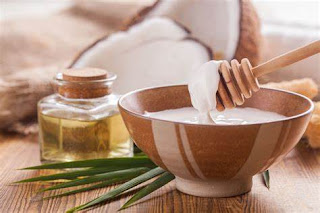BENEFITS OF USING COCONUT OIL
What Is Coconut Oil?
Coconut oil is a profoundly immersed oil that is customarily made by removing the oil from crude coconuts or dried coconut portions. At room temperature, it's strong, however, when warmed it can mellow or even liquefy. It's habitually utilized in cooking or applied straightforwardly to the skin and hair. Coconut oil is wealthy in medium-chain unsaturated fats, which are a type of soaked fat. Indeed, these medium-tie unsaturated fats make up about 65% of its absolute arrangement. The unsaturated fats found in coconut oil incorporate:
Lauric corrosive: 49%
Myristic corrosive: 18%
Caprylic corrosive: 8%
Palmitic corrosive: 8%
Capric corrosive: 7%
Oleic corrosive: 6%
Linoleic corrosive: 2%
Stearic corrosive: 2%
Despite the fact that coconut oil is about 90% soaked fat, it contains modest quantities of mono and polyunsaturated fats also. One tablespoon contains around 12 grams of immersed fat and 1 gram of unsaturated fat
It Can Kill Harmful Microorganisms
The medium-chain unsaturated fats in coconut oil have antimicrobial properties that can help ensure against unsafe microorganisms. This is particularly significant for skin wellbeing, as numerous sorts of skin diseases, including skin, break out, cellulitis, folliculitis and competitor's foot, are brought about by microorganisms or growths. Applying coconut oil straightforwardly to the skin may forestall the development of these microorganisms. This is because of its lauric corrosive substance, which makes up almost half of the unsaturated fats in coconut oil and can battle hurtful microorganisms. One examination tried the antibacterial properties of 30 sorts of unsaturated fats against 20 distinct strains of microbes. Lauric corrosive was discovered to be the best at impeding the development of microorganisms. Another test-tube study showed that lauric corrosive can murder off Propionibacterium acnes, a sort of microorganisms that prompts the advancement of fiery skin break out. Moreover, capric corrosive is another medium-chain unsaturated fat found in coconut oil, in spite of the fact that less significantly. Like lauric corrosive, capric corrosive has been appeared to have intense antimicrobial properties. A test-tube study showed that both lauric and capric corrosive adequately murdered off strains of microorganisms. Another test-tube study exhibited the counter contagious impacts of capric corrosive, showing that it had the option to hinder the development of specific kinds of organisms.
Coconut Oil Could Reduce redness on skin:
Persistent irritation is a significant segment of various sorts of skin problems, including psoriasis, contact dermatitis and skin inflammation. Curiously, coconut oil has been appeared to have mitigating properties. In one examination, specialists applied virgin coconut oil to the aroused ears of rodents. Not exclusively was coconut oil found to have a mitigating impact, yet it soothed torment also. Also, coconut oil may ease aggravation by improving cell reinforcement status. Cell reinforcements work by settling free extremists in the body, killing the receptive molecules that can add to irritation. A 2013 creature study took care of rodents various sorts of oil, including coconut oil, olive oil and sunflower oil. Toward the finish of the 45-day study, virgin coconut oil had improved cell reinforcement status and forestalled oxidative pressure as far as possible. It's critical to remember that most ebb and flow research is restricted to creature and test-tube considers, so it's difficult to tell how these outcomes may mean people. Nonetheless, in light of these investigations, coconut oil shows incredible potential in its capacity to decrease irritation when burned-through or applied to the skin.
Coconut Oil May Help Treat Acne
While some think coconut oil obstructs pores, impressive exploration shows it may really help treat skin inflammation. Skin break out is a fiery condition, and a considerable lot of the meds used to treat it work by focusing on and lessening aggravation. Since coconut oil and its parts may help diminish irritation in the body, it might likewise help in the treatment of skin break out. Besides, the antibacterial properties of the medium-chain unsaturated fats in coconut oil could likewise help lessen skin break out. Various examinations have shown that lauric corrosive, which represents almost 50% of the unsaturated fats in coconut oil, has been appeared to execute off the strain of microorganisms connected to skin inflammation. Truth be told, test-cylinder and creature contemplate having shown that lauric corrosive is more viable than benzoyl peroxide at forestalling the development of skin break out causing microbes. Alongside lauric corrosive, capric corrosive has been appeared to have calming and antibacterial properties.
Coconut Oil Can Moisturize Dry Skin
Notwithstanding its consequences for skin break out and irritation, applying coconut oil to your skin can likewise help keep it hydrated. One investigation in patients with gentle to decently dry skin contrasted the impacts of coconut oil with mineral oil, a kind of oil produced using petrol that is frequently used to treat dry skin. The fourteen-day study found that coconut oil fundamentally improved skin hydration and was similarly just about as compelling as mineral oil. It has likewise been appeared to help treat dermatitis, a skin condition portrayed by layered, irritated rashes. An examination contrasting the impacts of olive oil and coconut oil in 52 grown-ups with dermatitis found that applying coconut oil diminished dryness, notwithstanding helping treat skin inflammation. Another investigation discovered comparable outcomes, showing that coconut oil prompted a 68% abatement in skin inflammation seriousness, making it essentially more successful than mineral oil in the treatment of dermatitis. Keeping your skin hydrated can help protect its capacity as an obstruction to keep out microscopic organisms, advance the mending of scars and keep up generally skin trustworthiness




Your article is too good.
ReplyDeleteThankyou😇
DeleteI want to know " Is coconut oil a seed oil?"
DeleteNo, in oil trading, seed oils are considered to be those from annual crops.
DeleteOkay!
Delete